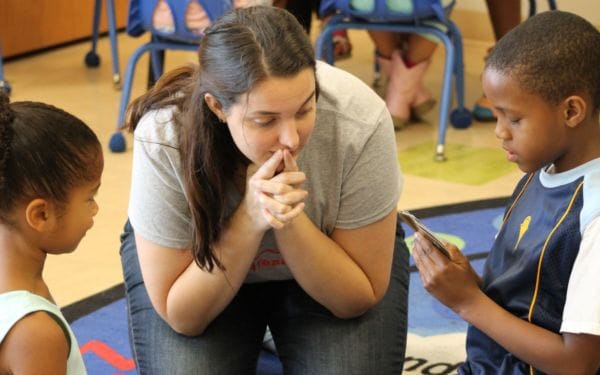May 10, 2021
By Aleta Margolis, Founder and President, Center for Inspired Teaching
Hooray for Monday is a weekly blog filled with questions, ideas, reflections, and actions we can all take to remodel the school experience for students.

If you’ve participated in our professional development over the years, you know we believe learning, for teachers and for students, should be 100% engaging – intellectually, emotionally, and physically. All of our work with teachers is improvisation-based. That’s because we believe great teachers think and act like improvisational actors.
In last week’s post, I described the 4 I’s and the role they play in establishing an improvisational mindset for us as educators.
An excellent teacher and an excellent improvisational actor have much in common.
- Both know how to build, not block.
- Both are keen observers.
- And both set clear objectives, and are equipped with multiple strategies to meet them.
Improvisational actors know their objectives, welcome opportunities, and obstacles, and constantly adjust their strategy as they encounter new information. For instance, in a scene in which an actor’s objective is to convince her reluctant partner to accompany her into a haunted house, she might hear her partner exclaim, “Look out for the tarantula crawling on your back!” to which the skilled improvisational actor might reply, “Oh, that’s my pet, Oscar. Would you like to hold him? He’ll keep us safe so we can reach the attic.” Now the scene has forward momentum, and lots of interesting possibilities, thanks to the actor’s ability to accept and build on her partner’s contribution.

A less skilled actor, surprised by the comment about the tarantula, might protest, “Where? I don’t see a tarantula? And besides, there aren’t any spiders in this part of the country.” This actor has blocked their partner’s contribution, and in so doing has moved the scene in a far less interesting direction.
A less skilled teacher can also become derailed by the unexpected, and end up blocking students’ learning. In a lesson on geometry, for instance, a teacher might face a frustrated student who jumps up from their desk and exclaims, “I can’t figure out this worksheet on perimeter!” and starts pacing around the room. The teacher might try to stop the student’s “misbehavior” and insist, “You need to sit down right now and do your worksheet!” This approach is unlikely to ignite the student’s desire to persevere in finding perimeters of polygons.
A skilled teacher who knows how to build, not block, might offer, “Why don’t you start in the corner and see how many steps it takes to travel around the perimeter of the room?” This skilled teacher knows how to recalibrate, and make a shift in strategy while maintaining forward momentum toward the learning objective.
Some theatre directors simply tell their actors what to do, where to stand, what kind of vocal inflection to use. This approach can result in a production that is technically fluent, but flat. A skilled director, on the other hand, avoids telling actors what to do. A skilled director asks probing questions designed to challenge the actors to figure out important information, such as characters’ motivations or objectives or the meaning behind the script, on their own. This approach tends to result in a richer, more meaningful product, as well as a useful learning experience for the actors involved.
Like a skilled director, an Inspired Teacher knows that telling students what to do might make things easier in the short term (“If you sit still, you’ll get extra recess.” or “Just multiply numerator times numerator and denominator times denominator.”). However, if we want our students to understand what they learn and be able to use it in the long term, we have to teach them how to think, instead of doing the thinking for them. (“When you multiply two numbers, you’re supposed to get more, right? So why is it, that when you multiply two fractions, you get less?”)
When we embrace an improvisational mindset, we welcome surprise – in the form of student questions, problems, and ideas – and we incorporate it into our lessons while remaining laser-focused on our objectives. As we become experienced with an improvisational mindset, we learn to respond to stimuli (whether they are painful or joyful) with curiosity and determination, instead of anger and resentment.
A shift toward an improvisational mindset will not only improve our effectiveness in the classroom, it just might increase our joy as well.
